When listening to Alicia Crossley play one of her 18 handmade recorders, which I’ve heard her play many times, a listener gets the feeling that the instrument was made for her. In this interview, we get to understand more about the recorder and its fascinating potential in the hands of such an extraordinary player.
Tell us a bit about yourself, Alicia.
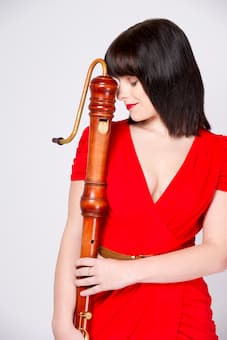
Alicia Crossley
I’m based in Sydney, Australia. I grew up in a small town southwest of Sydney. I began my music education at the Wollongong Conservatorium of Music through their early childhood music program and began playing recorder at six years of age. I also played bassoon and saxophone in high school, although I wouldn’t admit that to any professional musicians. Today, I have a focus on contemporary composition for the recorder and have a particular interest in the bass recorder.
I currently teach at seven schools and have about 400 students. Some are private, and some are full school classes, beginning around the age of seven to leaving age.
What led you to the recorder?
As a child I had asthma and my doctor recommended learning a wind instrument to help my breath control. The recorder was the natural wind instrument to pick up at that age.
How does your asthma affect your playing today?
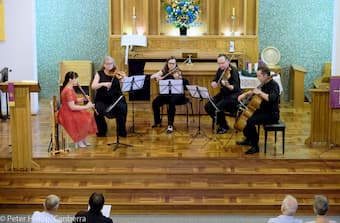
Alicia Crossley & The Acacia Quartet © Peter Hislop
Luckily my asthma doesn’t affect my performing, but if I don’t regularly practice, I notice a decrease in my breath capacity while playing.
Why was the recorder so attractive and not the oboe, or the guitar?
There are so many things to love about the recorder, from its diverse repertoire to getting to play instruments of different sizes. Not having to make reeds or change strings was also a bonus!
But it’s the range of textures and varying tone colours that can be produced on the recorder that enthral me. The large range of articulations (e.g. double tonguing, triple tonguing, flutter tonguing, slap tongue), vibrato (diaphragm vibrato, finer vibrato and labium vibrato), alternate fingerings, multiphonics, and voice amplification provide a wonderful array of sound scapes.
Can you compare the recorder against the flute for its expressive (or tonal) qualities?
We often compare the recorder and flute to each other for their similar tones (they are both part of the extended “flute” family) but the two instruments are vastly different in many ways including range, dynamics, articulations and agility. I wouldn’t say that one instrument is more expressive than the other, but I’d also say that their strengths lie in different areas.
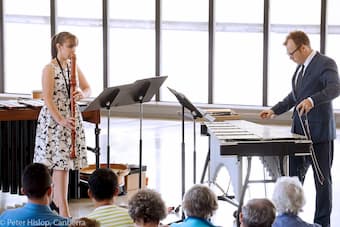
Duo Blockstix © Peter Hislop
What about amplification?
I have no issues with amplifying recorders. Recorders are naturally quite soft instruments and they also have a limited dynamic range, so there will be situations where the only way for an audience to hear clearly the recorder will be through amplification. Outdoor concerts, warehouse/large concert venues, and contemporary orchestral settings will often require recorder players to use microphones.
Please tell us a bit about your group Duo Blockstix
We are a unique ensemble I formed with percussionist Joshua Hill in 2014. Joshua also performs in the percussion group Synergy. We first performed together in 2011 on two new compositions I had commissioned (Tristan Coelho’s As the dust settles and Chris Williams’ Canto-Fiato) and realised we both have a shared love of contemporary music. We formed Duo Blockstix to explore repertoire for recorder and percussion. In 2017, we released a CD of Australian music called Duo Blockstix: Works for Percussion and Recorder.
While the combination of recorder and percussion may sound unusual, together they are highly effective. The range of articulations on the recorder has a natural percussive nature which combines well with percussion instruments, particularly mallet percussion instruments such as the marimba or vibraphone.
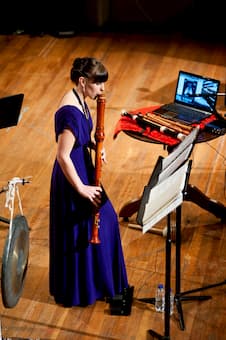
Alicia Crossley
Which composers do you like to play best?
At the moment my favourite baroque composer to perform is Telemann. He highlights the virtuosity and expressivity of the recorder beautifully in his compositions (his Suite in A minor TWV55:a2 is my favourite baroque composition to play). The contemporary composers I like best are the Australian Anne Boyd who immediately transports you to other worlds through her compositions, and the Dutch composer JacobTV who seamlessly fuses pop and classical music to form his addictive compositions.
What else do you do outside music?
I like to do a little bit of baking in my downtime, mainly cookies to enjoy with a cuppa. That said, there’s not a lot of downtime with practising, performing, recording and teaching. I love walking through local parks to relax.
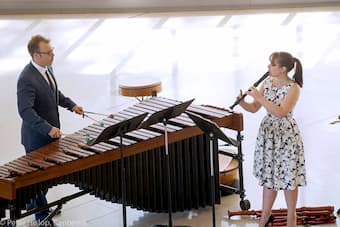
© Duo Blockstix © Peter Hislop
Do you think COVID-19 has changed people’s opinions of music?
It’s quite possible that through this pandemic and the restrictions, that we are developing a whole new audience for classical music as people look for different forms of entertainment and comfort. Appreciation of music has been vastly increased in this time, and that is evidence of how important music is for our souls. Music taps into what we can’t express in words, and through this isolated time, composers and performers are connecting deeper with audiences.
What are your musical plans for the future?
In 2021 I will be working on a recording project with seven Australian women composers exploring new compositions for the bass recorder. It has been exciting to collaborate with Jessica Wells, Anne Boyd, Amanda Cole, Alice Chance, Holly Harrison, Fiona Hill and Lisa Cheney as they explore the musicality and virtuosity of the bass recorder and I am looking forward to presenting these pieces for Australian audiences.
For more of the best in classical music, sign up to our E-Newsletter




